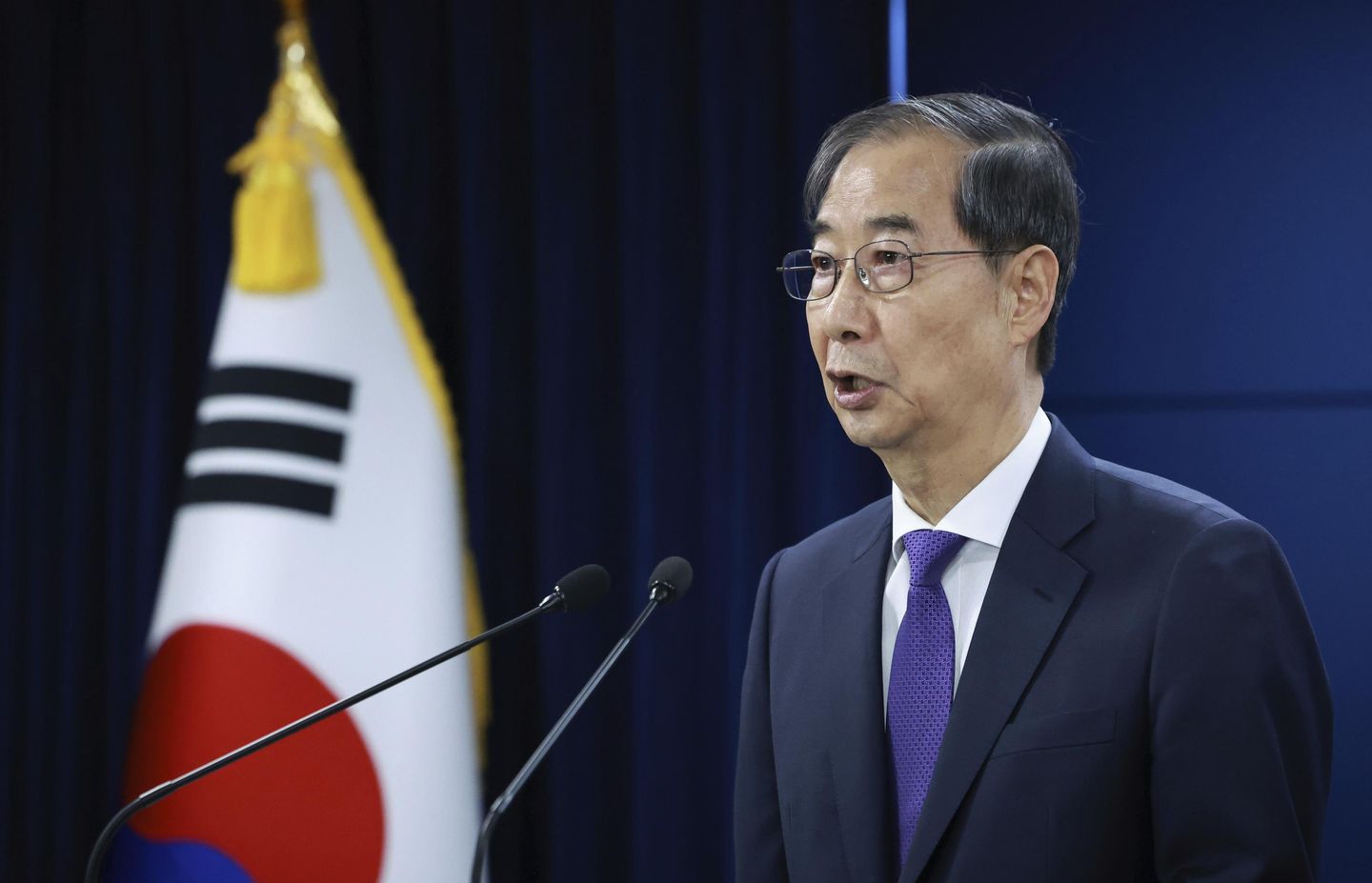
SEOUL, South Korea — Acting South Korean President Han Duck-soo announced his resignation Thursday amid speculation he will soon enter the race for next month’s snap presidential election, as the leading opposition candidate suffered a legal setback that could see him barred from the balloting.
The twin shocks jolted what had been a dull campaign and presented a bewildering range of electoral possibilities.
Mr. Han, who is also South Korea’s prime minister, took on the presidency this year after the impeachment and ouster of former President Yoon Suk Yeol, who is on trial for insurrection over his declaration of martial law in December.
Mr. Han’s resignation comes amid anticipation that he will declare his candidacy for the June 3 presidential election on Friday or Saturday. Deputy Prime Minister Choi Sang-mok, who is also the finance minister, will serve as acting president until June 4.
Meanwhile, the surging opposition campaign of Lee Jae-myung, the presidential candidate for the liberal Democratic Party of Korea, suddenly faces uncertainty after the Supreme Court ruled Thursday that Mr. Lee lied during the 2022 presidential campaign in violation of election laws.
The high court sent Mr. Lee’s case back for retrial in the Seoul High Court, which had acquitted him in March. It is unclear how fast the court can move on his retrial.
If Mr. Lee is again acquitted, his campaign would continue. But a guilty verdict would levy a fine of more than 1 million won ($701) and make him ineligible to run for political office for five years — leaving the DPK without a candidate.
If he wins on June 3 before a judgment — which some pro-Lee media are predicting — his case would become moot due to presidential immunity.
Mr. Lee, 61, won the DPK presidential primary by a historic landslide (88.97%) on April 27 and has been leading in all polls by a country mile. The latest, joint-produced by four agencies found him with 42% approval ratings. Mr. Han was a distant second place, with 13%.
As the nation’s conservative leader, Mr. Han, 75, is seen as the best bet to beat Mr. Lee on June 3.
However, the ruling People Power Party is set to conclude its two-person primary on Saturday, and Mr. Han is neither a member of the party nor a PPP candidate.
Though Mr. Han trails Mr. Lee in the polls, he is ahead of the PPP’s two primary candidates.
In his long political career, Mr. Han has been an independent, appointed technocrat.
Back-door politicking is expected in the days ahead as anti-Lee forces seek a “unified candidate” under a “big tent,” said Yang Sun-mook, an adviser to a newly established group to support Mr. Han.
Mr. Yang has correctly predicted Mr. Han’s maneuvers in recent days.
Though the current situation has no direct precedent, a unified candidacy has happened twice before in Korean political history, Mr. Yang said.
How Mr. Han might sync with the winner of the PPP primary on Saturday is unclear, but cooperation looks essential to defeat Mr. Lee.
In the May 1 poll, former PPP leader Han Dong-hoon, 52, who represents the party’s young, centrist wing and who turned against Mr. Yoon after his declaration of martial law, had a 9% favorability rating. Former provincial Gov. Kim Moon-soo, on the party’s right wing, had 6%.
Even if the two PPP candidates combine with the elder Mr. Han, their total numbers reach 28% — far short of Mr. Lee’s 42%.
The May Day poll, however, found 18% of voters were undecided.
Polling took place from April 18-30, when Mr. Han’s entry in the race was merely rumored. Now that his political ambitions are clear, he could feasibly win over some undecided voters.
It is widely thought that if Mr. Kim wins the PPP’s primary, he will step aside to make way for the elder Mr. Han. But the younger Mr. Han — no relation to the now-resigned acting president — may resist taking that step if he wins.
Mr. Yang says the PPP candidate may respond to public pressure from across Korea’s right wing.
“People expect a unified candidate to take down Lee Jae-myung,” he said. “A unified candidacy could come through approval rating comparisons over the next 10 days: May 11 is the final date for presidential candidates to register.”
Mr. Yang expects Mr. Han to deliver a speech laying out his position on Friday.
An election showdown between Mr. Lee and the elder Mr. Han would be a clash of opposites.
Mr. Lee comes from poverty and fought through politics the hard way: rough-and-tumble city mayorships and provincial governorships. He has proven bulletproof against all forms of lawfare for years, handily beating charges alleging everything from illegally sending funds to North Korea to corrupt practices in his earlier as a local politician. (The lies he allegedly told during the 2022 campaign relate to corruption allegations in his past role as mayor of a satellite city of Seoul.)
A tough leftist and polarizing figure, Mr. Lee has sought in recent months to occupy central ground, walking back his prior pro-China and anti-Japan stances.
Conversely, Mr. Han is an elite technocrat — a trade expert and former ambassador to the U.S. with decades of ministerial-level experience in administrations of both parties.
He generates less passion than Mr. Lee, but in a country deeply divided in the wake of Mr. Yoon’s martial law decree, Mr. Han’s safe-pair-of-hands persona may win votes.
There is no love lost.
Mr. Han took over as acting president after Mr. Yoon stepped down. Mr. Han was subsequently impeached by the opposition in a fight over constitutional court judge appointments and returned as acting president via a legal judgment.
That signaled that Mr. Lee’s DPK, which had led the impeachment of 27 officials in addition to Mr. Yoon and Mr. Han, had overstepped.












